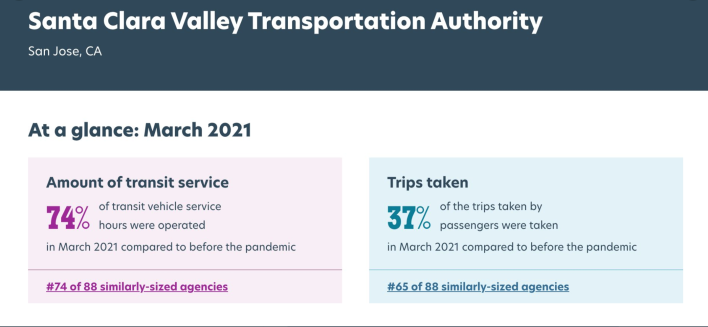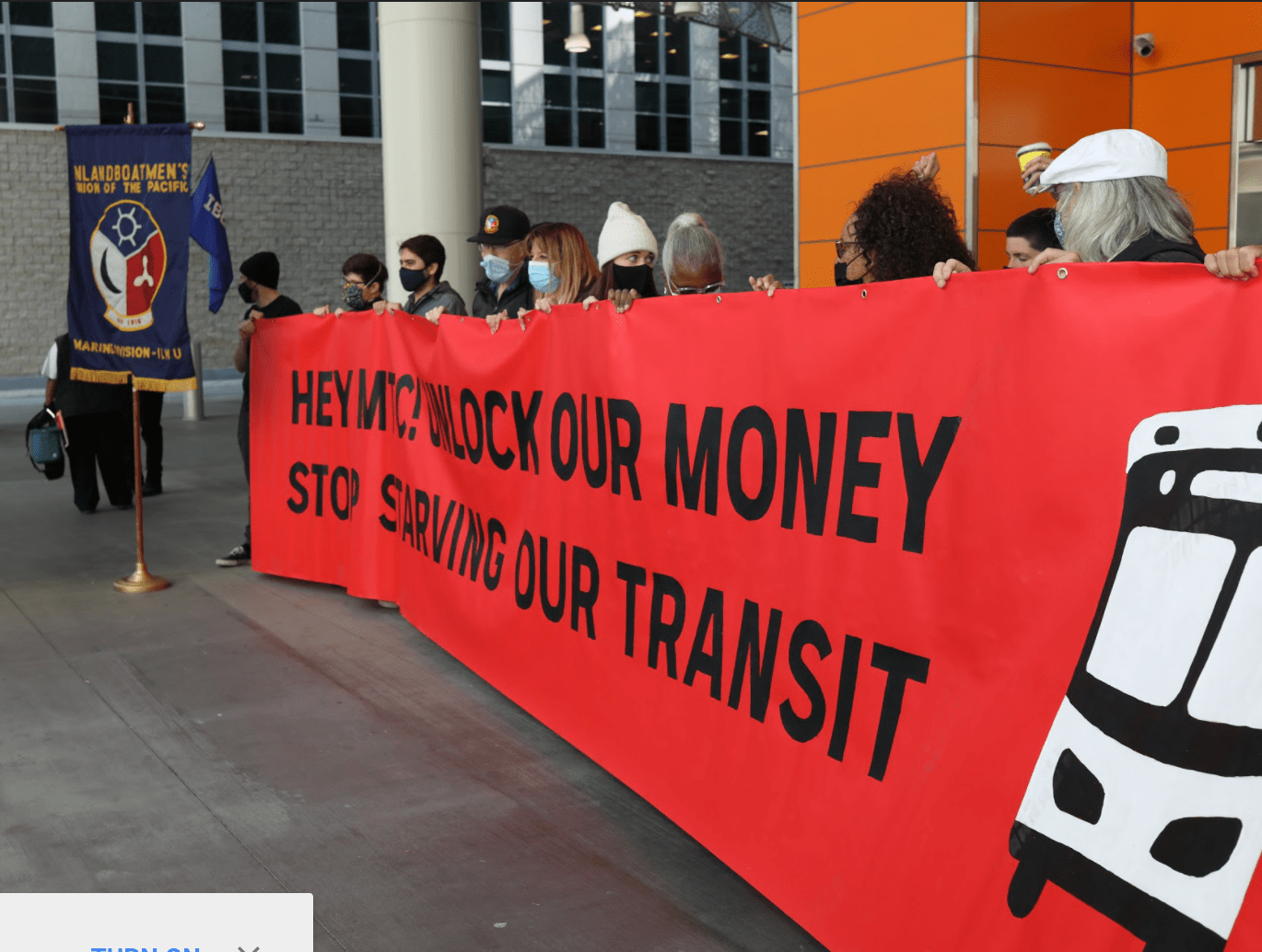A coalition of unions, transit riders, environmentalists, and community leaders rallied in downtown San Francisco earlier this month to demand that the Metropolitan Transportation Commission (MTC) release $1.7 billion in federal aid from the American Rescue Plan Act (ARP).
Those at the rally decried the MTC's process for handing out the funds, pointing to transit agencies in other parts of the state releasing plans to return to full service this fall while local agencies are planning "austerity budgets" for the next fiscal year, which begins on July 1. For example, Los Angeles Metro plans to restore full bus and rail service by the fall while peer agencies in the Bay Area have not even released a plan for when pre-pandemic levels of service might return.
"Agencies begin planning their budgets for the next fiscal year in June which means they need to know how much ARP money they will receive to prepare bold budgets to restore service and stimulate the economy in this space," explains Joty Dhaliwal and Nathan Swedlow with the People's Transit Alliance (PTA), a program of the Democratic Socialists of America East Bay.
Without any estimation as to how much ARP money they will receive, agencies are forced to prepare budgets that don't reflect the cash. "At the very least, MTC should present agencies with ARP fund estimates."
For its part, MTC argues that it has already allocated more money to transit agencies than they will have lost due to COVID-related cuts and lost fares through the end of June and that gives the agency, and the region, time to make better decisions with the remaining federal stimulus.

At the May 12th meeting of the Programming and Allocations Committee for MTC, executive director Therese McMillan explained that the goal of the new funds from the American Rescue Plan should be based on new assumptions and what we've learned during the pandemic and not just for returning service to what it was before.
In her presentation (PDF), she argued, "This (ARP Funding) provides a valuable window to shift from looking 'in the rear-view mirror' of pre-pandemic assumptions, to looking 'through the front window' into what restored or new transit service should be going forward beginning FY 2021-22—increased services for our most transit-dependent and loyal transit riders most in need of those services, as well as enhanced capacity for customers returning to a restored economy"
In the memo, MTC also outlines the three principles that will guide its process going forward: to stabilize and sustain transit, to restore and reimagine service, and to improve customer service.
"Keep in mind that we at MTC are seeking a consensus for a herd of cats that can be very, very different from each other," writes Randy Rentschler, Director of Legislation and Communications for MTC.
"Some operators, VTA in Silicon Valley, SamTrans, AC Transit, most suburban operators who are supported by sales taxes, or very stable or growing property taxes (AC Transit) have avoided the feared economic contraction so their underlying revenues are sound or growing. Others, such as MUNI, BART, and Golden Gate, are in a much different situation – each with their own unique story."
The memo, MTC's long-term plan for the funds, and the principals outlined did not placate the rally-goers who still believe the best course of action is to release the funds to transit agencies now, or as soon as possible, so that service can be quickly restored and firm plans made. Responding to the memo, Richard Marcantonio with public advocates claimed that while what MTC is saying sounds nice, it doesn't work in practice.
Marcantonio writes:
1. The memo states that "The principles are intended to allow operators [i.e., transit agencies] to plan for service increases over the coming months and refrain from budgeting for FY 2021-22 with an assumption of austerity." So they heard our concerns about austerity. The problem is, how is that supposed to work if the agencies don't know how much ARP funding they can plan with?2. MTC concedes one of our main points: "Although there remains uncertainty about financial sustainability in the medium to long term, transit must be there for riders now, or riders will not be there for transit." In other words, service has to precede ridership. But the principles for distributing funds don't implement that insight.3. MTC states that "operators should take action to swiftly amend budgets to accommodate allocations as they are made available, to address operating adjustments in a timely manner." This is ironic: MTC gets all the time it wants to thoughtfully plan the allocation of funds, and the agencies have to "swiftly" figure out how to use that money. Now is the time for thoughtful planning about hiring and service restoration, and that won't happen at most agencies until they have a number to put in their budget.
But the MTC plan is not without its supporters. SPUR, the Bay Area Council, and the Silicon Valley Leadership Group wrote the following in a letter of support (PDF):
- We agree with MTC’s approach to stabilize and sustain transit because transit is the lifeblood of our cities, our economy, and key to reducing the region’s congestion and greenhouse gas emissions. We strongly support MTC’s approach to release funding in tranches. This is a sensible way to restore transit service, while saving funds for future revenue shortfalls and to fund the efforts needed to execute principles (2) and (3).
In addition, the directors and executives of fourteen regional transit agencies penned a letter to MTC (PDF) dated May 10 thanking the agency for its prolonged process in distributing the federal funds.
One of the agencies that signed on to the letter is the Santa Clara Valley Transit Authority (VTA). According to a report to the VTA Board of Directors, VTA is operating at 74 percent of pre-pandemic service and attracting 37 percent of riders. Monica Mallon, the founder of Turnout4Transit, simply tweets, "We are really not doing well" in response to the statistics. She later goes on to tweet statistics showing that Samtrans, another agency signed on to the letter, is doing even worse.

But while VTA's leadership is on board with the MTC plan, their drivers are not.
"As it stands this moment, people are losing their jobs because they can't get to work. People are not able to get to appointments because we're at 80 percent of service," says John Courtney with ATU Local 265 which represents VTA transit drivers "We've actually had this money since April and we're coming on June and we don't even have a plan to get back to regular service."
MTC's process is also coming under fire for creating a seat at the table for the executive directors and CEOs of transit agencies and not for the groups demanding that funding be released quickly.
On June 9th, the Programming and Allocations Committee of MTC will host a workshop for Commissioners to hear directly from transit operators about the challenges that the pandemic has posed for their Bay Area transit operations, as well as on their outlook for service provision and financial sustainability in FY 2021-22 and beyond. Advocates argue that having this meeting without similar sessions for riders and employees creates a situation where many voices are being left out.






